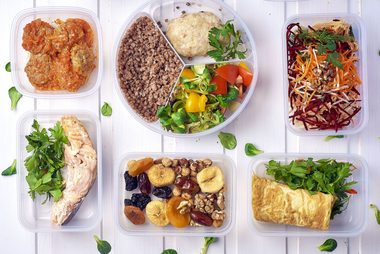
Figure out how many calories you actually need
If you’re looking for scientifically proven ways to start losing weight right now, your first order of business is to answer the question: How many calories should I eat to lose weight? “A good guideline is 2,000 calories per day for adults,” says Scott Kahan, MD, MPH, the director of the National Center for Weight and Wellness in Washington, D.C. But the best way to get an accurate picture of how many calories you need to maintain or lose weight is to plug your numbers into a Basal Metabolic Rate calculator. “You enter your height, weight, gender, and age, and based on these four variables, the calculator will tell you what your daily calorie burn is,” he says. This number refers to how many calories you burn by doing absolutely nothing for 24 hours—and represents the minimal amount of energy (i.e. calories) you need in order to function. To answer your question, “how many calories should I eat to lose weight?” estimate how many calories you burn with exercise and add it on, then subtract 500 calories from the total number to determine how many calories you need to cut out to start shedding pounds.
Joy L. Bauer, MS, RD, CDN, the founder of Nourish Snacks and the health and nutrition expert on The Today Show, makes it even easier: “I recommend trying to stay within a calorie range versus landing on a specific number,” says the New York City-based nutritionist and author of several books including From Junk Food to Joy Food. “For most women trying to lose weight, I’d suggest 1,200 to 1,600 calories per day,” she says. “For men, between 1,600 and 2,000 calories would be their target range.” This is how to cut 3,500 calories in one day (Yes, really.)

Don’t overestimate calories burned when you work out
It’s true that the more you exercise, the more wiggle room you have with food. “Exercise increases lean body mass, which in turn revs metabolism 24/7,” Bauer says. But most exercises burn way fewer calories than people think—in part because exercise machines are inaccurate in their estimate of your calories burned, making it too easy to undo the effects with just a few extra nibbles.
If you are looking for a workout with the best bang for your caloric buck, try Orange Theory. Orange Theory’s boot camp-style workouts burn far more calories—561 to be exact—than Barre (299), and CrossFit (417)—according to new data from My FitnessPal. But exercise doesn’t have to be hard core to add up and make a difference.
Your weekly exercise goal should be two hours and 30 minutes (about 22 minutes each day or 50 minutes three times per week) of moderate-intensity aerobic activity such as brisk walking along with muscle-strengthening exercise that targets all major muscle groups on 2 or more days a week, the federal Centers for Disease and Control Prevention states.
“After putting in a workout at the gym or getting up early to jog around your neighborhood, you’ll be less likely to want to dig into that slice of birthday cake at an office birthday party or a spin through the drive through after work,” Bauer says. Always run any changes to your exercise routine by your doctor first.
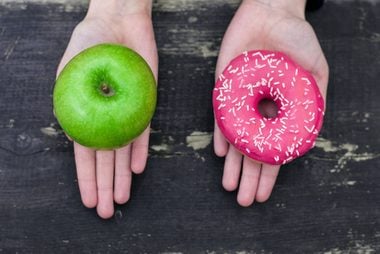
Remember that not all calories are equal
Yes, 70 calories is 70 calories if it is a medium-sized apple or a cookie in the short run, but it’s still important to focus on the quality of foods, Kahan says. “Different types of calories or foods have different effects on how hungry or satisfied we feel after eating them, which may lead to eating fewer or more calories,” he says. For example, protein is more satiating while sugar tends to be less so. There are other caveats as well, he says. “Although a calorie appears to be a calorie when it comes to weight regulation, that is not the only point of interest,” he says. “People with diabetes can’t rely solely on calories when meal planning— instead they must focus on how foods affect blood sugar.” There are other lifesaving things you must know if you have diabetes. When someone asks, “how many calories should I eat a day?” Bauer says, “If you eat 1,400 to 1,800 empty calories (for example, cheeseburgers, cookies, chips, and fries), you will definitely be hungry and unhealthy, but if you eat quality calories—high-fiber, lean protein, good fats—those same calories will keep you satisfied and satiated while boosting all aspects of your health.” This is how the foods you eat can affect the number of calories in a pound.
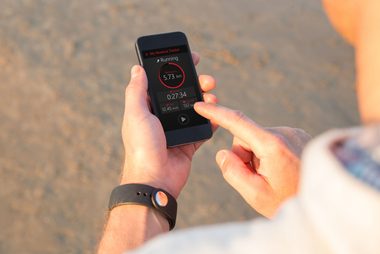
It’s not cheating to use an app
You don’t need calculators, pen and paper, or even the ability to do quick math in your head anymore, because certain apps make it easy to count calories. Some popular ones include MyFitnessPal, Lose It, and SparkPeople. “If you are counting calories to lose weight, it is still an effective strategy—because at the end of the day, weight loss is a mathematical equation. If you take in fewer calories than you burn, the weight will come off,” says Bauer. There are some easy ways to cut calories.
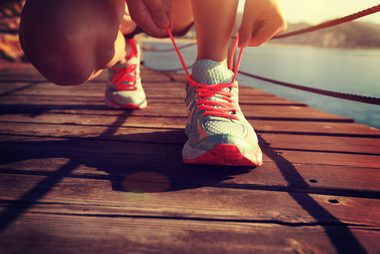
Calorie counting isn’t for everyone
For some people, calorie counting is nerve-wracking, frustrating, and just not fun. “If you fall into this category, then avoid it at all costs,” Bauer says. “Instead, follow a program that provides a specific meal plan that’s balanced for calories and nutrients, where all the math is already done for you.” There are so many of these online now, including JoyBauerWeightLoss.com. Don’t miss these 42 easy, fast tips for weight loss.

Go for the burn
Some foods will turn your meals into calorie burners. These include cayenne peppers, according to a study in Physiology & Behavior. “We found that consuming red pepper can help manage appetite and burn more calories after a meal, especially for individuals who do not consume the spice regularly,” says Richard Mattes, distinguished professor of foods and nutrition at Purdue University, in a news release. And all it takes is about a half a teaspoon to maximize these effects. On the flip side, some shocking foods are actually loaded in calories, and can really add up.
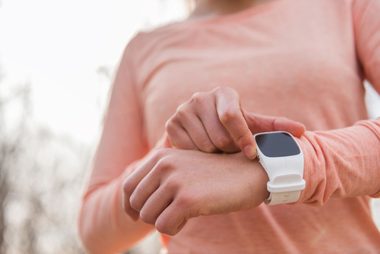
Scrap your activity monitor
Ubiquitous activity bands can reveal way more than just your step count, and while they are pretty good at measuring heart rate and other vital signs, they are less than adept at determining how many calories you are burning off. A study in the Journal of Personalized Medicine looked at how accurately the Apple Watch, Basis Peak, Fitbit Surge, Microsoft Band, Mio Alpha 2, PulseOn, and the Samsung Gear S2 assess heart rate and energy expenditure among 60 volunteers. When it comes to calories burned, even the most accurate device was off by an average of 27 percent, and the least accurate was off by 93 percent.
If activity isn’t feasible for you right now but you still want to slim down, check out these genius tips for losing weight without a lick of exercise.
